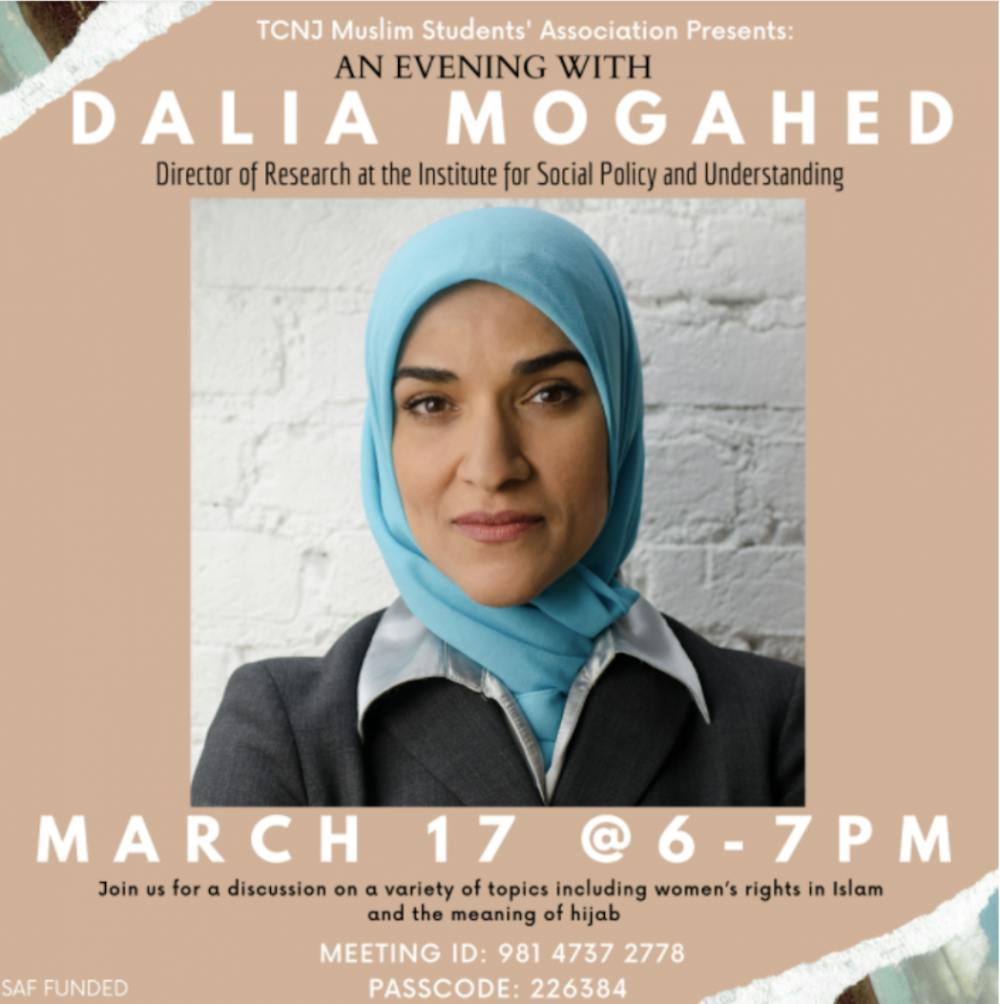By Julia Duggan
Senior Staff Writer
The College Muslim Students’ Association invited a guest speaker to discuss women’s rights in Islam and the meaning of wearing a hijab.
Dalia Mogahed is currently the Director of Research at the Institute for Social Policy and Understanding. Her Ted Talk about being Muslim in America went viral with over 4 million views.
http://www.youtube.com/watch?v=wzkFoetp-_M
She is the former Executive Director of the Gallup Center for Muslim Studies and has testified before the U.S. Senate Committee on Foreign Relations about U.S. Engagements with Muslim communities.
During her talk, she discussed the traditional headwear of the Hijab. A common theme throughout the discussion was that Muslim women more vulnerable to attacks and feel obligated to having to perfectly represent their religion.
“I think that anyone can learn about spirituality and courage and putting conscience over conformity from this moment in history and how American Muslim women are responding,” Mogahed said.
Mogahed explained that Muslim women in America feel the need to always stay peaceful when responding to hateful comments stemming from Islamophobia. The discussion focused on two themes: where Islamophobia comes from and why Muslim women receive more harsh comments than men due to the hijab.
While focusing on Islamophobia, Mogahed explained a few of the stereotypes that modern day American society has of Muslim women, in order to explain the impact of Islamophobia and the symbol of the hijab.
“I decided to express this new consciousness in this new pride in my faith by becoming visibly Muslim and I started wearing hijab,” Mogahed said. “My white feminist friends were absolutely aghast. Now some of them were supportive, but there was a local group that was like ‘why are you oppressing yourself,’ and it was usually a question asked about me behind my back.”
She summed up why her culture and personal faith has been misconceived in America by stating “there are at least three reasons that there's a huge difference sometimes not always between the rights of women in Islam and the kind of perception that a lot of people have.”
“Muslim women especially do bear the brunt of Islamophobia,” Mogahed said. “According to our surveys…American Muslim women are more likely than American Muslim men to report or to say that they've experienced religious based discrimination. Now I'll add that Muslims in general are more likely than any other faith group to face religious discrimination. Muslim women are also more likely to fear for their personal safety from white supremacists or neo-Nazi groups.”
Despite these statistics, Mogahed mentioned that women still choose to wear a hijab.
“I realized that every kind of oppression stems from the idea that we are slaves to something other than God,” Mogahed said. “I mean if you think about it, a person who is attached to something other than God is in some ways oppressing themselves. One person oppressing another is the result of the belief that they have that they won't be held accountable for exploiting another human.”

Mogahed then focused her attention on the media’s portrayal of Muslim culture around the world. She pointed to a study done at Stanford University where a sociologist analyzed how the media covers countries reflecting women’s rights on religion, specifically the Muslim religion. The results showed that if women’s rights are similar between a country with a large Muslim population and one without, there will be more negative media coverage in the area with a high Muslim population.
To further expand on this study, Mogahed explained how Muslims are covered by the media when domestic abuse happens. Another study was done to see if Muslim women face domestic abuse more than other groups of women.
“The answer is no,” Mogahed said. “The way it's framed is that when a horrible thing happens like something like even domestic homicide in a Muslim family, it's framed as a quote ‘honor crime.’ When that same domestic homicide happens in, you know, the general public it's called domestic homicide.”
Students had a variety of topics that they asked Mogahed about in the Q&A portion of the discussion. One question that Mogahed answered was about how women should feel when they are the only one who wear hijab when working. She explained there is a stigma that the one person represents the entire Muslim race and feels the pressure of trying to correctly represent their religion.
“We have to get over this idea of having to be represented,” Mogahed said. “Just do your best. Be yourself, answer as best as you can, and if you don't feel like answering, then don't answer that guy.”
At the end of the discussion, Mogahed had a simple but clear message of what everyone should do in response to conflicting views of Muslims.
“We should be able to build an environment where women are protected by men and men are protected by women where we are defending each other,” Mogahed said.







